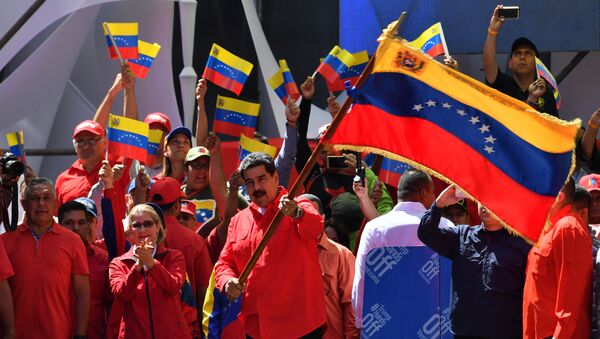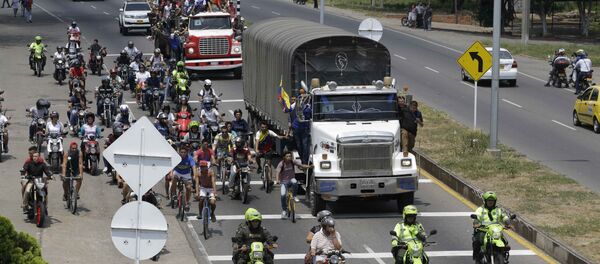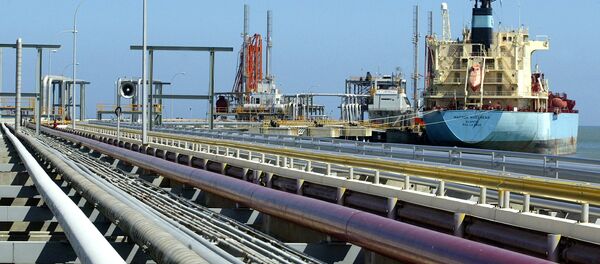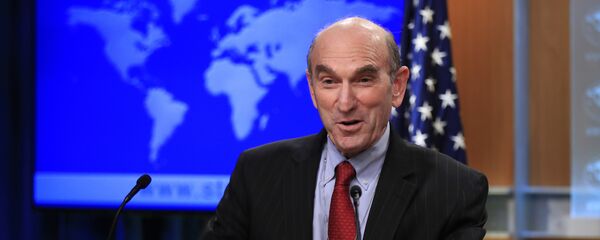This comes after Venezuelan President Nicolas Maduro said that an electric energy war, declared by the United States, will not succeed. Earlier the same day, local media reported that a blackout had hit 21 out of 23 of Venezuela's states, affecting millions of Venezuelans in what the national electricity supplier described as "sabotage" at a major hydroelectric power plant.
READ MORE: Cuban President Calls Massive Blackout in Venezuela Result of 'Terrorist Attack'
Venezuela's self-proclaimed president Juan Guaido said the incident was a matter of "chaos, concern and anger" and "evidence of the usurper's inefficiency", adding that light would return once Maduro is removed from power.
His statements were echoed by US Secretary of State Mike Pompeo, who tweeted that power shortages and starvation are the results of the Maduro regime's incompetence. He tweeted "No food. No medicine. Now, no power. Next, no Maduro".
Sputnik has discussed the latest developments in Venezuela with Frederick B. Mills, Professor of Philosophy, Bowie State University.
Frederick B. Mills: A lot of the analysis on Venezuela focuses on the economic interests of the United States and the resources, the energy-rich country and minerals etc., but really the political dimension is equally important because when Chavez was elected in 1998 really there began an epic in Latin America lead by Venezuela which had basically three pillars.
One was to recognise a multipolar world and to diversify trading relationships with the rest of the world. Second, was to promote regional integration and independence which challenged US hegemony in the region. And third, is what Chavez called paying the social debt, which meant a transfer of a great deal of financial resources to social investment.
So these three things really posed an alternative and a challenge to the goal of imposing neoliberal regimes throughout the hemisphere. So it's not just an economic interest, but a political, regional, and geopolitical interest.
READ MORE: Pompeo on Venezuela Blackout: 'Maduro's Policies Bring Nothing but Darkness'
Sputnik: Now how big a deal is Venezuela for most Americans? Is it making front-page headlines in the US? My colleagues just asked me this question and I've been to America a couple of times, it's an interesting question in itself. What does the average American, in say Portland, are they actually talking about Venezuela? Is it the main cause of communication, the discussion around the dinner table in restaurants in America, what can you share with us?
And I think it's thanks to the reporting of independent journalists and alternative media like the Gray Zone Project, Venezuelan analysis and other media, that now the anti-war movement has basically integrated the demands against US intervention in Venezuela into its programme. And so there's going to be national demonstrations, for example, on the 16th and on 30th of March. So it's gone from being an obscure issue to really the front page and to a great deal of conversation in the United States.
READ MORE: UN Refugee Agency Has Not Seen Increase in Refugees Fleeing Venezuela
Sputnik: Venezuela has an opposition-controlled National Assembly and a visible opposition, so with that in mind, in your view is Nicolas Maduro really such a hardline politician as he's often portrayed in the media And is it possible to run the country effectively under the sanctions imposed on him? That's the question, I had an interesting conversation with an expert yesterday, I had spoken to a Russian political analyst about what happened with Guaido leaving the country after being told by the judiciary that he was not allowed to leave the country. He didn't comply with that order, he came back, and I asked two questions to experts is that a sign of weakness or strength?
And the analyst here said that it's definitely showing weakness to the Americans and the American expert said it was actually showing strength and saying, "Look, we're not such a dictatorship, after all, we've let him go, he has come back and we're being very fair in terms of his freedom of movement". How do you see it from your point of view?
The polls in 2017 and the most recent ones this year still show the majority of Venezuelans don't want a military intervention in the country and would prefer dialogue to increased polarisation, sanctions, sabotage, violence. This simply isn't a feasible path forward. And as far as the sanctions… and today we see the electric grid is down in most of Venezuela, the subway is not running, one out of four major telephone companies isn't operational, this still hasn't provoked any serious ruptures in the military.
It hasn't brought Venezuela, so to speak, to its knees. So I think you have a situation where the only feasible path forward, where a democratic, if not consensus, at least coexistence and accords on certain national issues can only come about through dialogue.
Views and opinions, expressed in the article are those of Frederick B. Mills and do not necessarily reflect those of Sputnik.






